East and Southern Africa
Contact the team
Featured content

The Changing Landscape of Cash Preparedness: Lists, Risks and Relationships
Report
What are feasible lead times to deliver CVA to recipients in the Horn of Africa? What are the barriers and enablers to ensuring a timely and high quality humanitarian response? What does it take for organizations to be effectively prepared?

Community Reflections: The Cumulative Impact of Keeping People Informed
Report
This briefing note presents an overview of the findings from Ground Truth Solutions’ in-depth, qualitative interviews with community representatives of displaced people and aid recipients in Nigeria and Somalia in May and June 2022. As part of the Cash Barometer initiative, we invited youth leaders, women’s leaders, traditional community leaders and community members in Nigeria and Somalia...
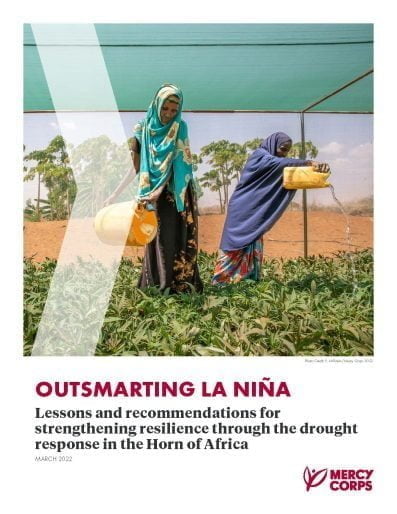
Outsmarting La Niña: Lessons and Recommendations for Strengthening Resilience Through the Drought Response in the Horn of Africa
Policy paper
One of the worst droughts in a generation is currently unfolding in the Horn of Africa. The impacts of the drought are exacerbated by, and in some cases further fueling, increases in conflict in the region. As a result, more than 13 million people in Ethiopia, Kenya, and Somalia are already experiencing extreme hunger. In many ways, those living in the drylands of the Horn are more prepared...
All news and events
181 – 200 of 366 results
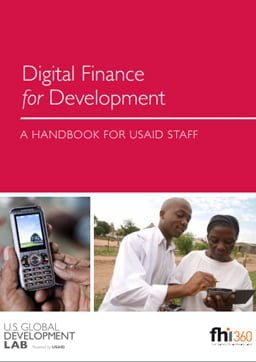
Digital Finance for Development: A Handbook for USAID Staff
Guidelines and Tools
This handbook is designed to enable USAID personnel to maximize the Agency’s use of and contribution to the growth of digital financial services in emerging markets around the world. As an Agency, USAID brings significant comparative advantages to the collective effort required to build out financial...
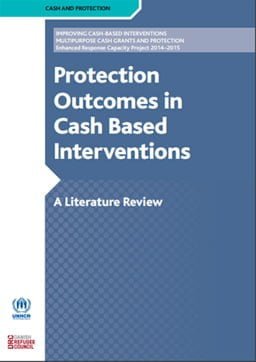
Protection Outcomes in Cash-based Interventions: A Literature Review
Report
This literature review examines existing research to determine whether the use of cash and vouchers is contributing to the promotion of protection and gender outcomes for beneficiary communities, following the WFP and UNHCR 2013 study on gender, protection and cash. This literature review focuses on these...
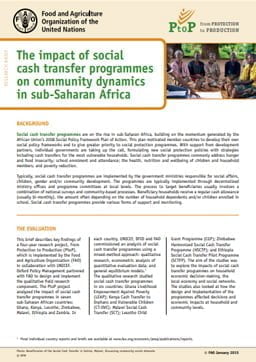
The Impact of Social Cash Transfer Programmes on Community Dynamics in Sub-Saharan Africa
Report
Social cash transfer programmes are on the rise in sub-Saharan Africa, building on the momentum generated by the African Union’s 2008 Social Policy Framework Plan of Action. This plan motivated member countries to develop their own social policy frameworks and to give greater priority to social...
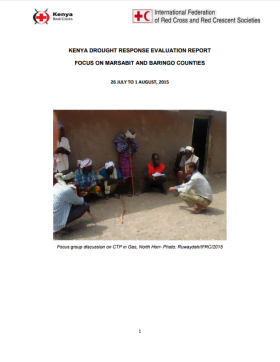
Kenya Drought Response Evaluation Report – Focus on Marsabit and Baringo Counties
Report
An evaluation of a drought response which involved school feeding, cash transfers and nutrition outreach activities.

Final Report for Assessment of the Impact of Cash For Work Beneficiaries training for Phases IIB and IV
Report
Phases IIB and IV of the Cash For Work (CFW) project were implemented by FAO Somalia over the period 2013-2015 and aimed at enhancing access to food by the food insecure households in the short-term, while supporting restoration of food production through the rehabilitation/construction of productive...

A Review of Evidence of Humanitarian Cash Transfer Programming in Urban Areas
Report
Urban poor populations frequently experience disasters of varying typology and intensity. When set against a backdrop of poverty and marginalisation, their needs can be complex. As recent urban crises have pushed humanitarian agencies to respond in urban areas, this literature review examines the...

A Review of Evidence of Humanitarian Cash Transfer Programming in Urban Areas: Annexes
Report
Annexes to accompany the working paper ‘A review of evidence
of humanitarian cash transfer programming in urban areas”
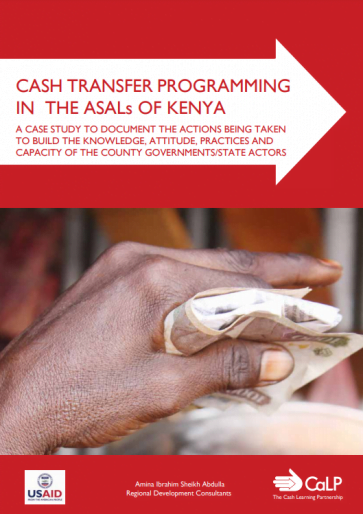
Cash Transfer Programming in the ASALs of Kenya
Case Study
The CALP Network commissioned a study to document the impact and lessons learned from its engagement with state actors in the ASAL counties. The study involved collection of data through secondary and primary sources. Given the focus of the project, a qualitative approach was deemed as most...

Expect the Unexpected: A Case Study of Impacts of Urban Food Vouchers in Somalia
Case Study
Beginning in early 2013, CRS implemented a series of food voucher programs, designed to meet the urgent food needs of vulnerable IDP and host households in urban communities. The vouchers were unconditional, but restricted to food purchases. The programs began in Kismayu in January 2013 (to December...
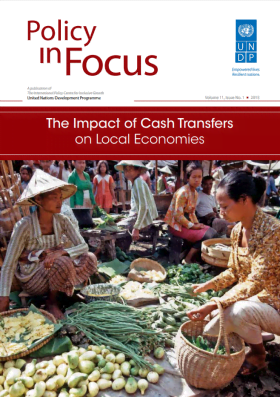
The Impact of Cash Transfers on Local Economies
Policy paper
In this special edition of Policy in Focus, leading authors and practitioners present their research on how cash transfers can impact the local economy when implemented in a developing country. The aim is to gather and review research results and evidence, obtained from various methodologies ranging from...
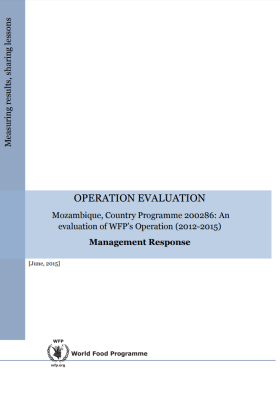
Mozambique, Country Programme 200286: An evaluation of WFP’s operation (2012-2015) – Management Response
Report
The final evaluation covers WFP’s country programme (CP) 200286 (2012-2015). It was intended for both accountability and learning purposes and focuses on assessing: the appropriateness and coherence of the operation its results the factors explaining the results. The evaluation assessed the...

Value for Money of Cash Transfers in Emergencies
Report
The objective of this study is to analyse evidence on the Value for Money (VfM) of cash transfers. The study reviews evidence on the economy, efficiency and effectiveness of cash, vouchers and in-kind transfers, in order to support a more structured analysis of the VfM of different transfers. It is based...

Are Public Works Programmes Effective in Reinforcing Social Protection Systems? Evidence from Northern Namibia
Report
This paper analyses the effectiveness of public works programmes (PWPs) in creating employment, reducing poverty and reinforcing the existing social protection system in Namibia. Using data and information from a survey conducted in northern Namibia, it is established that while public works programmes...

The Impacts of Malawi’s Social Cash Transfer Programme on Community Dynamics
Report
This short paper evaluates the impacts of Malawi’s Social Cash Transfer (SCT) programme on the household economy, the local economy and the social networks. The SCT programme was launched in Mchinji district in 2006. The programme provides regular cash payments to ultra-poor and labour-constrained...
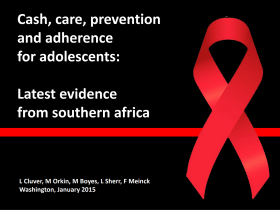
Cash, Care, Prevention and Adherence for Adolescents: Latest evidence from southern Africa
Presentation
This presentation looks at cash, care, prevention and adherence for adolescents using the National Longitudinal study of Adolescents in Southern Africa.

Markets in Crises: South Sudan case study
Report
Not long after achieving independence, South Sudan descended into conflict, which has fuelled displacement and food insecurity.Although markets continue to function in the country, humanitarians have paid relatively little attention to market-based responses to the crisis. Looking primarily at Juba, this...

Annex B: Lebanon Case Study
Report
Cash and vouchers are increasingly provided as assistance to people affected by disaster and crisis. Studies and evaluations have firmly established that cash transfers can be an appropriate alternative or complement to in-kind assistance. Whilst some evidence exists on the Value for Money (VfM) of...

Factors Affecting the Cost-efficiency of Electronic Transfers in Humanitarian Programmes
Report
Led by Oxford Policy Management (OPM) with support from Concern Worldwide, this research aims to answer the key question: Are electronic transfers more cost-efficient than traditional manual based cash delivery methods, and under what conditions? Cash is increasingly offered to households in...
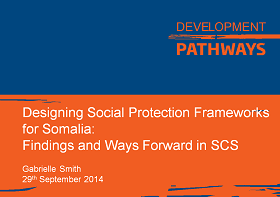
Designing Social Protection Frameworks for Somalia: Findings and Ways Forward in SCS
Report
This presentation was made on behalf of Development Pathways at the social protection framework validation meeting that took place at the Jacaranda Hotel in Nairobi, Kenya on 26 September 2014. It looks at designing social protection frameworks for Somalia and covers: 1.Activities and Methods 2.Macro...
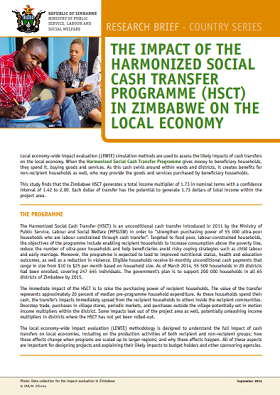
The Impact of the Harmonized Social Cash Transfer Programme (HSCT) in Zimbabwe on the Local Economy
Report
Local economy-wide impact evaluation (LEWIE) simulation methods are used to assess the likely impacts of cash transfers on the local economy. When the Harmonized Social Cash Transfer Programme gives money to beneficiary households, they spend it, buying goods and services. As this cash swirls around...




